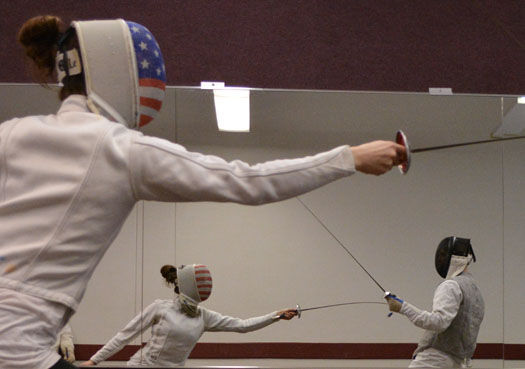American Olympic fencer trains SIU club

April 21, 2014
In a narrow room full of swords and facemasks, several students greeted an Olympian to campus.
American Olympic fencer Nicole Ross came to teach the SIU Fencing Club how to become better athletes from 2:30 to 5:30 p.m. Saturday at the Recreation Center.
Advertisement
Ross, 25, of New York City, started foil fencing when she was 9 years old and made her first Olympic team in London in 2012. She said she got into fencing after watching “The Princess Bride.”
“I don’t remember this, but my mom said that I really liked the movie and really wanted to try fencing,” Ross said. “She called up the local club and the woman who answered the phone has since been my coach.”
Irene Gershon along with her husband, Simon Gershon, have trained Ross. The Gershon’s are both professional fencing coaches from Ukraine.
She said she is strictly a foil fencer; a foil is one of three weapons used in fencing, along with epees and sabres.
“I’ve never picked up a sabre besides, to like ,move it out of the way,” Ross said. “I do know epee through [my boyfriend.]”
Ross’ boyfriend and now coach, Soren Thompson, is an epee fencer who represented the U.S. in the 2004 and 2012 Olympics.
“For availability, it’s awesome,” she said. “He can kind of give me a lesson whenever and he’s just introduced a lot of concepts I didn’t pick up before.”
Advertisement*
After becoming an Olympian, Ross said she thought she would eventually move on from fencing.
“That’s exactly the opposite feeling I had,” Ross said. “I felt like, ‘I could be so much better. I suck right now.’”
She said her next goal is to qualify for the 2016 Rio de Janeiro Olympics. Ross said she trains multiple hours a day, biking or swimming for conditioning, then fencing.
This time the road to the Olympics is longer than that of London in 2012. Every four years, two-weapon team events in fencing are cut, she said. In 2016 women’s foil and men’s sabre will be cut.
“That means that we have to qualify as individuals,” she said. “Basically I have to be top 12 in the world or the second-highest ranked American to qualify.”
Ross said the biggest stress an Olympian faces is the financial burden.
“It’s really hard to live in Manhattan and make enough money to live there and to train,” she said. “I think a lot of people misconceive fencing as a rich man’s sport and it’s definitely not like that. We all struggle.”
Club President Joseph Wilson, a senior from Millstadt studying anthropology and history, said he has been contacting Ross online for a few months to get her to come.
Ross said one of the biggest points she expresses to younger athletes is setting goals.
“I have so many goals that I set for myself in fencing, which are in different varied stages,” she said. “Anything from, today I’m going to train this much… To, I’m trying to qualify for the 2016 Olympics.”
He said the club paid Ross roughly $1,200 to visit, which included her flight and hotel costs.
“Luckily the fencing club has a decent budget,” Wilson said. “So we were able to afford it without having to worry about it.”
Wilson said the club paid for Ross to come talk about how to get women involved in the sport, what club members can do outside practice to train and to do several workouts.
The club has eight members, including three women. Three of the fencers faced Ross in a match.
Alexa Baczak, a sophomore from Peoria studying anthropology, said she hopes more women get involved in the sport. Baczak, who is new to the sport, she said she is glad Ross came to show the club some techniques.
The club has about two tournaments each semester.
For more information, please visit the club’s Facebook page at https://www.facebook.com/SiuFencing.
Advertisement







